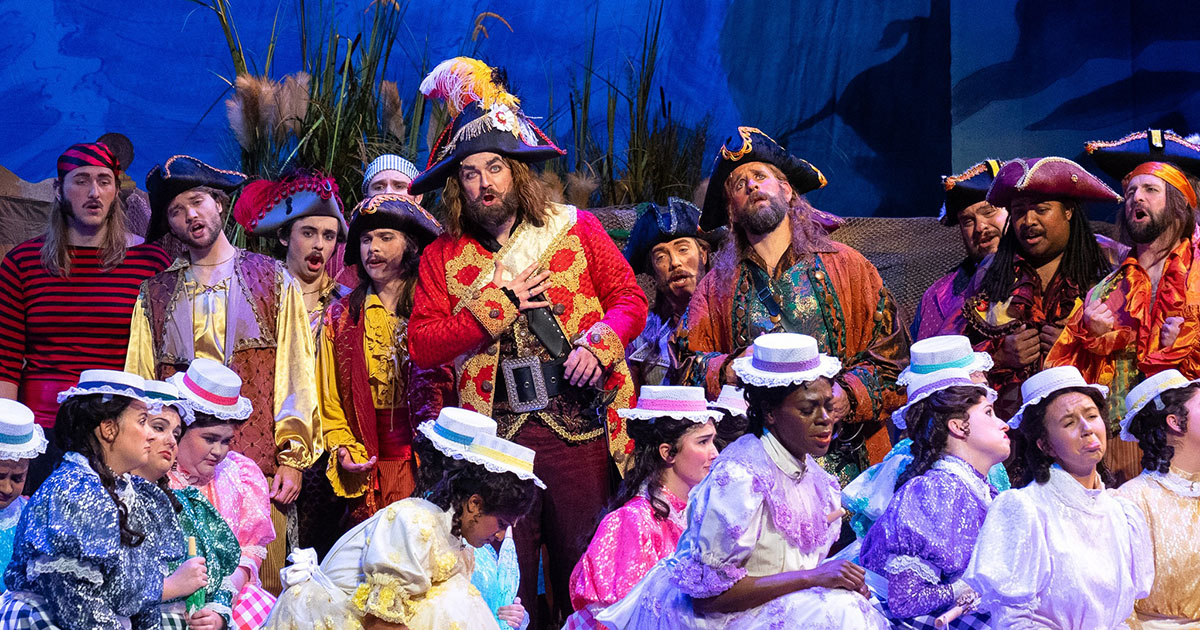Although the American musical theatre has had a colorful existence of innovation and evolution, it owes that existence to the genre of operetta that graced stages of England and Europe in the last half of the 19th Century. Admittedly, though, time and changing theatrical sensibilities have relegated the bulk of operetta to the dusty shelves of yesteryear, their music and topical stories existing only as curiosities for historians. There are exceptions to that fact—most notably the English operettas of librettist William S. Gilbert and composer Arthur Sullivan and their topsy-turvy world of comic satire that mocks twisted logic and laughable human conceits. Along with some significant attention from Broadway producers, U.S. opera companies have been drawn to the works as a way of expanding their repertory into lighter fare to contrast with their traditional operatic offerings, retaining the emphasis on impressive voices and eye-catching staging. That is certainly the case with Knoxville Opera and their delightful and incredibly entertaining production of The Pirates of Penzance at the Tennessee Theatre.
Clever word-humor lies at the heart of Pirates just as it does with all the Gilbert and Sullivan works. Admittedly, some of Gilbert’s satire and Sullivan’s musical parody has faded in the timeliness of its references, but there is still plenty for modern audiences. The big joke for Victorians started with the title. In the 1870s, Penzance was a sleepy little resort town on the Cornwall coast, not exactly a location where one would expect to find vicious pirates—or any pirates at all, really. Of course, these pirates are not typical, having a soft spot for orphans and a distaste for attacking anyone weaker than themselves.
It is often said that Gilbert’s reference for the character of Major-General Stanley was a popular general at the time, Sir Garnet Wolseley. Of course, any such parody has been completely lost to time in meaning and geography, but one need not know this to enjoy one of the most delicious comic characters in musical theatre. This production features baritone Troy Cook in the role of Major-General Stanley, the father of a mind-boggling multiple of “mostly” eligible daughters, and a “major” source of the production’s comic gravity, as well as its visual and vocal comedy. Cook struck a marvelous balance between campiness and mock seriousness, embracing the satire with open arms. Most importantly, he delivered the tongue-twisting, high-speed patter song “I am the very model of a modern Major-General” with as much satisfying clarity and humor as is possible in a modern large theatre context. And, yes, kudos go to super-titles and some judicious amplification that allows the comic satire of the lyrics to work for 21st Century audiences.

The love-interest roles of Frederic and Stanley daughter Mabel were taken by tenor Derrek Stark and soprano Hanna Brammer. Stark was satirically heroic and vocally impressive, his boyish countenance and clear lyrical tenor made him a perfect Frederic. Brammer, making her Knoxville Opera debut, offered a beautifully powerful and flexible soprano to the lovelorn pair. Mabel’s aria “Poor Wandering One” was really delightful and satisfying, no doubt intended as a parody of Italian coloratura, perhaps Donizetti.
No stranger to the role of the Pirate King, baritone Craig Irvin is also an alumnus of the UT Opera Theatre and has appeared in several Knoxville Opera productions over the recent years. Irvin’s stature, swashbuckling stage presence, and commanding rich voice, were all he needed to make the role his once again. Of course, every Pirate King needs a loyal assistant to make things go right. Baritone Daniel Spiotta, a favorite of Knoxville audiences, was marvelous as Samuel, adding his own comic swash to his buckle, and a rich voice and colorful characterization to the pirate band.
Some productions of Pirates seem to downplay the role of Ruth, the “Maid of All Work,” whose confusion of the words PILOT and PIRATE was the basis for poor Frederic’s mistaken apprenticeship. Thankfully, though, KO and stage director Dean Anthony saw things differently and cast the marvelous Joyce Campana as Ruth, giving the role depth and a strong comic presence through her fabulous vocal articulation.
UT Opera Theatre members Meghana Krish and Nicole Dayton were the featured Stanley daughters Kate and Isabel, respectively. Soprano Ashley Victoria Jones, making her KO debut, was Edith Stanley.
Stage director Anthony has also made a hit with his ensemble groupings and choreography, be they pirates, Stanley daughters, or the Keystone-like bumbling police force led by their Sergeant, bass Allen Michael Jones. Kudos also go to Chorus master Christy Lee for the choral glue that is the charm of the colorful crowd scenes.
Conductor Joseph Mechavich was in the Tennessee Theatre pit with the Knoxville Symphony Orchestra, having last led last year’s KO production of La Traviata. Again, Mechavich brought a textured preciseness to the orchestrations that was lovely and charming, and placed Sullivan’s lyrical music in the best possible light. Theatrically, though, one might have wished for a bit more energy and crisper dynamics in scenes where musical numbers tumbled along and dramatic points were being made.
Knoxville Opera’s The Pirates of Penzance has one more performance on Sunday, October 27, at 2:30 PM, in the Tennessee Theatre.





